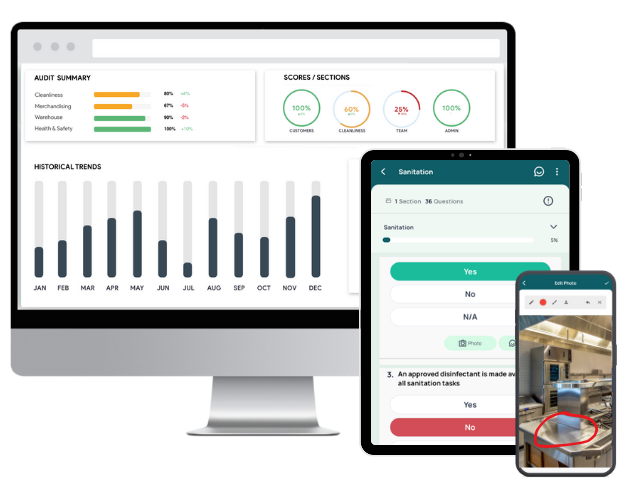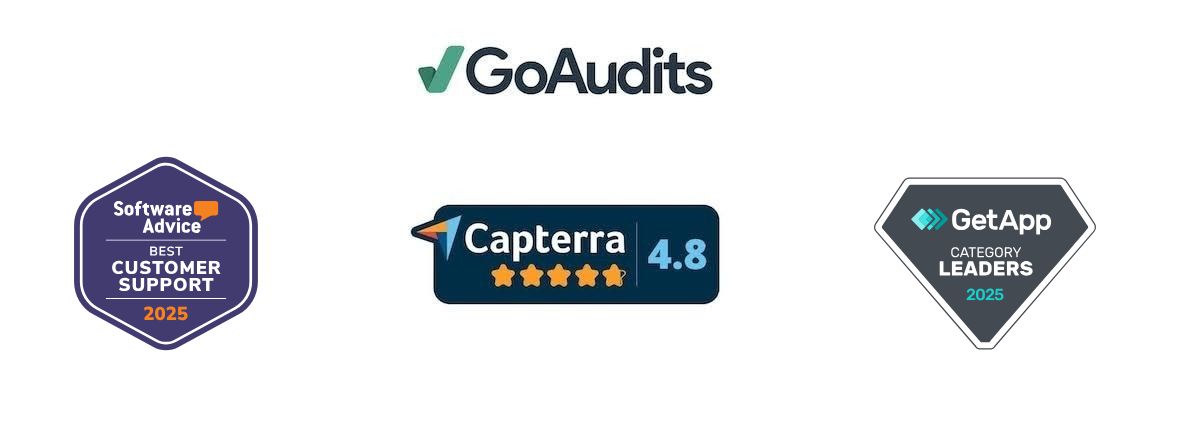According to the UN’s Food Waste Index Report 2024, the world discarded 1.05 billion tonnes of food in 2022, nearly one-fifth of all food produced for human consumption. That’s equivalent to one billion meals wasted every day. The problem spans the entire supply chain, with manufacturers accounting for 16% of global food waste, retailers for 2%, and hospitality and food service for 12%.
For restaurants, hotels, and other food businesses, these losses translate into higher costs and a growing sustainability challenge. A food waste audit helps identify exactly where, why, and how waste occurs, giving you the data to take targeted action. By systematically measuring and analyzing waste, businesses can reduce disposal costs, improve efficiency, and meet sustainability goals.
This article will explore food waste audit in detail and how food waste software can simplify the process of auditing, tracking, and reporting food waste.
What is a Food Waste Audit?
A food waste audit is a systematic process of measuring and analyzing the amount and types of food discarded within a specific setting, such as a restaurant or food production facility. It involves collecting data on where waste is generated, recording the quantity, and categorizing the reasons behind it. The audit provides accurate insights into inefficiencies in food purchasing, preparation, storage, and service. Understanding these patterns can help identify targeted strategies to reduce waste, cut costs, and improve sustainability.
Pre-Consumer vs Post-Consumer Food Waste
Food waste is generally divided into two main categories:
| Description | Examples | |
| Pre-consumer food waste | Food discarded before it reaches the customer, reflecting issues in procurement, storage, or production planning | Spoiled inventory, overproduction in kitchens, trimmings from preparation, and items that expire before use |
| Post-consumer food waste | Occurs after food has been served to customers, highlighting challenges in portion sizes, menu design, and customer behavior | Uneaten portions left on plates, excess food from buffets, and items disposed of due to customer dissatisfaction |
Why Conduct a Food Waste Audit?
Conducting a food waste audit provides measurable benefits that go beyond compliance or reporting. Some key reasons include:
- Cost Reduction: The economic cost of global food waste is estimated at $1 trillion a year. By identifying where food is wasted, you can streamline purchasing, improve inventory control, and reduce unnecessary expenses.
- Operational Efficiency: A food waste audit highlights inefficiencies in preparation, storage, and portioning, allowing you to optimize workflows.
- Sustainability Goals: Food waste is responsible for around 8% of global greenhouse gas emissions and uses 24% of the water allocated for agriculture. Reducing food waste lowers environmental impact, decreases landfill contributions, and supports corporate social responsibility commitments.
- Data-Driven Decisions: With accurate waste data, you can make informed choices about menu planning, portion sizing, and supplier management.
- Regulatory and Customer Expectations: Food businesses are expected to demonstrate sustainable practices. A food waste audit shows accountability and transparency.
Steps to Conduct a Food Waste Audit
Follow the steps below to collect reliable data, gain insights, and implement effective strategies.
1. Plan and Prepare for the Audit
Start by setting clear objectives. Decide whether the audit is for cost reduction, sustainability goals, compliance, or operational improvements. Define the scope, whether you will measure waste from a single kitchen, an entire facility, or across multiple sites.
Assemble a team with representatives from operations, kitchen staff, and management. Assign clear roles and responsibilities to ensure accuracy. Establish a realistic timeframe and select audit days that reflect normal operations. Finally, secure the audit location, ensuring there is enough space for sorting, weighing, and recording waste safely.
2. Use Digital Checklists to Conduct the Audit
Digital checklists streamline the audit process and ensure no data is missed. Create categories for waste types such as preparation waste, spoilage, plate waste, and expired inventory. During the audit, collect and sort all food waste into these categories. Use standardized containers and labeling for consistency. Record details such as weight, source, and reason for disposal directly into the checklist. They reduce errors, make real-time tracking easier, and simplify later analysis.
👉 GoAudits food safety software can help you centralize data and capture visual evidence with photos, timestamps, and geolocation for complete transparency. You can also tailor checklists to your exact requirements or create your own. The mobile app works even offline, so you can perform audits in remote areas.
Here are some food safety audit checklists that can help you reduce food waste. You can sign up for free and start using these checklists.
- Food Inventory Checklist
- Food Storage Checklist
- Food Receiving Checklist
- Kitchen SOP Checklist
- Food Safety & Hygiene Checklist
- Freezer Maintenance Checklist
- Food Safety Checklists & Audit Templates
- HACCP-Based SOP Templates
3. Measure Data and Analyze the Results
Once the collection is complete, review the recorded data. Calculate the total waste and break it down by category, source, and frequency. Identify trends, such as recurring spoilage of specific ingredients or excessive plate waste. Document the findings clearly, highlighting both problem areas and potential savings. Summarize the results in a report that can be shared with decision-makers and staff.
👉 With GoAudits, you can view audit performance scores, monitor trends across sites, and identify recurring problems. Its smart dashboards provide a clear overview of waste patterns, enabling you to pinpoint root causes quickly.

4. Act on Results
Turn insights into strategies. Develop targeted solutions, such as adjusting portion sizes, improving inventory management, training staff, or donating surplus food. Prioritize actions that are practical and cost-effective. Implement the changes and monitor their impact over time. Schedule future audits to track progress and ensure long-term reductions in food waste.
👉 GoAudits allows you to automate workflows, schedule audits, and assign corrective actions during inspections. You can track progress in real time, ensuring accountability and timely resolution. Automatic notifications and reminders keep your team aligned.
What is Food Waste Tracking Software?
Food waste tracking software helps food establishments such as restaurants, cafeterias, and food manufacturers monitor, record, and analyze food waste generated during food storage, preparation, cooking, serving, or consumption. It records details such as the type, quantity, and reason for waste, giving you accurate data instead of relying on assumptions. This software often integrates with scales, smart bins, or mobile apps to ensure precise tracking and real-time reporting.
How Food Waste Management Apps Simplify Food Waste Audits
A food waste audit traditionally requires manual logging, which is time-consuming and prone to errors. Food waste software automates this process by collecting and organizing data instantly. You can access clear reports that highlight waste patterns, peak times, and cost implications. With this visibility, you can identify inefficiencies, adjust purchasing or portion sizes, and set measurable goals. The software not only reduces the burden of audits but also provides actionable insights to drive long-term waste reduction strategies.
Essential Features of Food Waste Management Software
The following features are essential when evaluating a food waste management system.
Inventory Management
Food waste management software should enable accurate inventory management. Real-time stock tracking, automated reordering thresholds, and expiration date monitoring can prevent overpurchasing and reduce spoilage. You can align purchasing decisions with actual demand, ensuring resources are used efficiently.
Waste Tracking, Auditing, and Reduction
Tracking waste at every stage of the supply chain provides clear insights into inefficiencies. You should be able to categorize waste by source, type, and reason. Automated auditing tools help identify recurring issues, while reduction features suggest corrective actions, such as portion adjustments or supplier changes.
Analytics & Reporting
Data-driven insights are essential for controlling costs and enhancing operational efficiency. Robust reporting dashboards highlight waste trends, financial losses, and performance benchmarks. Customizable reports enable easier communication of progress to stakeholders and facilitate informed decision-making.
👉 With GoAudits, you can generate audit reports instantly, customize them, and share them for immediate action. It automatically compiles inspection data into professional reports with photos, timestamps, and corrective actions included. Real-time distribution ensures that the right people are informed without delays, enabling faster decision-making.

Sustainability and Compliance
Modern systems go beyond cost savings by supporting sustainability efforts. With features like donation management, surplus food can be redirected to community organizations. Expiration alerts help reduce spoilage, while recycling and composting tracking support environmentally responsible practices. Regulatory compliance tools ensure that your operations meet local and international waste disposal and food safety standards.
Staff Training & Development Tools
Staff engagement is vital to reducing waste. Built-in training modules, best practice libraries, and performance tracking ensure your team understands waste management protocols. Gamification or progress tracking can further motivate staff to adopt sustainable practices consistently.
Integration Capabilities
A food waste management app should connect with POS systems, accounting software, and supply chain platforms. Seamless integration with existing systems eliminates data silos, streamlines reporting, and enhances efficiency.
How to Choose the Right Food Waste Management Software?
Selecting the right food waste management app requires a clear understanding of your needs and careful evaluation of available options. Here are some points to keep in mind:
Understand your business requirements
Start by identifying your current challenges and goals. Do you want to track waste in real time, generate compliance reports, or reduce disposal costs? Map out these priorities. Defining your requirements early helps you narrow down software that aligns with your operations instead of adopting tools that add unnecessary complexity.
Check software reviews and testimonials
Look at verified reviews and case studies from businesses similar to yours. Pay attention to feedback on performance, ease of use, and customer support. Testimonials often reveal insights that product descriptions overlook, giving you a realistic picture of how the software performs in practice.
Affordable and scalable
Choose a solution that fits your budget without compromising essential features. At the same time, think long-term. The software should scale as your operations grow, whether you expand locations, increase staff, or adopt new waste management practices. Scalability prevents costly migrations later.
User-friendly and intuitive
Complex systems can discourage adoption. The software should be easy to navigate, with a clear dashboard and straightforward reporting features. An intuitive interface minimizes training time and ensures your team uses it consistently.
Free trials and personalized demos
Request free trials or demos tailored to your business. Trials allow you to test core features in real scenarios, while personalized demos help you evaluate how well the software integrates with your workflows. Both reduce the risk of investing in a tool that doesn’t meet expectations.
Data security
Food waste data often includes sensitive operational and financial information. Confirm that the software complies with data protection standards and uses secure storage methods. Strong security measures protect you from data breaches and build trust with stakeholders.






